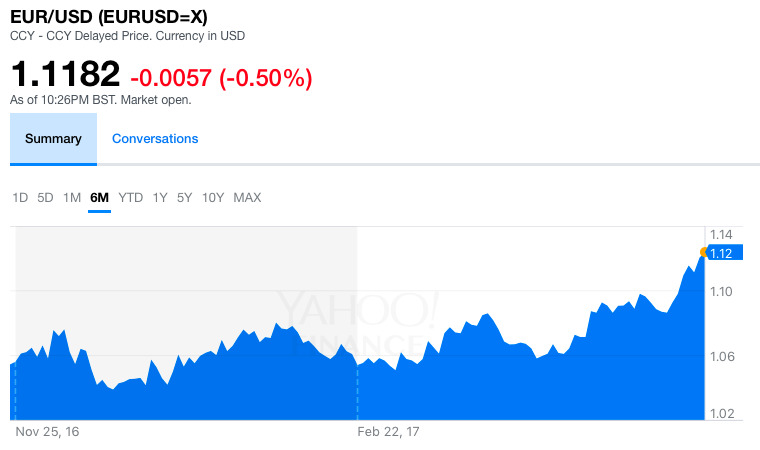It no longer appears likely that Apple's overseas earnings can be repatriated back to the United States at more favorable tax rates this year, as plans for tax reform— including deep cuts to health care spending aimed at enabling a huge tax cut— have been delayed. On the other hand, unsettling political news is also having an adverse affect on the US dollar, creating an unanticipated side effect: a more favorable currency exchange environment for Apple's foreign earnings.
Apple's foreign currency headwinds
The strengthening of the US Dollar— which began to have a notable impact on Apple's earnings reports starting in 2014— has repeatedly been cited by the company as negatively affecting its earnings in a number of ways.
In its Fiscal 2014 10K filing, the company noted that weakening foreign currencies "adversely affects the U.S. dollar value of the Company's foreign currency-denominated sales and earnings," and added that a stronger dollar generally results in the company being forced to raise its prices overseas, with the potential result of reducing demand as buyers balk at paying more for the same thing.
In 2015, the strengthening dollar caused Apple to raise prices in its stores ranging from Australia, Canada, New Zealand, France, Denmark, Sweden, Finland and Portugal.
In the summer of 2016, Britain's vote to leave the European Union caused the British Pound to fall dramatically against the dollar, resulting in an up to 20 percent price hike on some Mac models in the U.K., followed by a 25 percent hike in price tiers in its App Store earlier this year.
This January, Apple's chief executive Tim Cook noted that China's currency had devalued by 6 percent year over year compared to the dollar. The shift was large enough to prompt the company to report non-GAAP earnings on a constant currency basis to isolate its actual performance from the currency shifts out of its control.
Other American companies operating internationally have suffered from the same unfavorable currency headwinds, although Apple has in general weathered these fluctuations better than many of its peers simply because it is so profitable and because it has the capital and credit to enter long term hedging contracts to mitigate risk.
At the same time, the impact of foreign currency shifts in China has been a much larger issue for Apple than companies like Facebook, Google, Microsoft and U.S. hardware makers— few of whom have been able to materially penetrate the Chinese market at all, let alone making it a leading chunk of their business.
Apple has also taken advantage of the stronger dollar's purchasing ability to invest in large infrastructure, production and retail projects internationally, including a series of new retail stores in China, its massive new Battersea Power Station development in London, and a string of research and development facilities being built around the world.
American political chaos disrupting markets
Strong earnings in the winter quarter jolted Apple's stock price upward despite foreign currency headwinds. Apple shares continued to rise on apparent optimism that a new Republican president— backed by Republican control of both chambers of Congress— could quickly implement business-friendly tax breaks, including lower repatriation rates on Apple's very large overseas earnings.
However, that optimism turned out to be misplaced. Efforts to slash health care spending to enable very large tax breaks was met by popular resistance that fragmented the controlling political party, delaying the full passage of both health care cuts and subsequent efforts to shift tax policy.
Proposed travel bans, restrictions on visas, the halting of infrastructure spending and the postponement of a repatriation tax holiday that Apple and other Silicon Valley companies had been working with Hillary Clinton to draft as part of a seres of tech-friendly policy positions were already causes for concern before a series of troubling reports erupted last week— triggering fears of disruptive impeachment proceeding— appeared to cause shares of Apple to drop dramatically in tandem with the rest of the market.
At the same time, American political turmoil is hurting the dollar. That will have a positive impact on Apple's global profitability moving forward, even if it also makes it more expensive for Americans to travel abroad or buy foreign products. American political turmoil is hurting the dollar. That will have a positive impact on Apple's global profitability moving forward
The Euro, which nearly reached $1.40 in early 2014, fell down to $1.04 at the end of 2016. Yesterday it jumped back up above $1.12, a six month high against the dollar.
The British Pound, which reached $1.71 in 2014, fell as low as $1.22 after Brexit but has since inched back up to $1.30.
The Japanese Yen reached up to 124 in 2015, then collapsed to nearly 100 last winter; it has since improved to today's 111 against the US Dollar.
China's RMB has steadily depreciated against the USD since 2014, but the fall has at least stopped this year.
A weaker dollar means that Apple is now making more money (as enumerated in dollars) in a variety of territories at its current prices. It also holds the potential for Apple to lower its prices on hardware and apps overseas, a move that could be expected to induce demand. It remains to be seen how the US Dollar will compare going forward, but Apple is no doubt relieved to see more favorable exchange rates that will help it to boost its ability to earn money overseas, even if it has to delay plans to bring that cash back this year.
 Daniel Eran Dilger
Daniel Eran Dilger







-m.jpg)






 Christine McKee
Christine McKee
 Malcolm Owen
Malcolm Owen

 Sponsored Content
Sponsored Content

 Amber Neely
Amber Neely











19 Comments
Great article (and observation) Daniel. Thank you.
Off Topic: If you had invested a measly $100 in Bitcoin 7 years ago you'd have $72.9 million as of today.